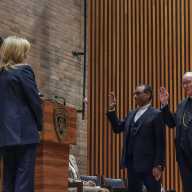
Just when you thought Gilead couldn’t get any worse, “The Handmaid’s Tale” brings you to Washington, D.C.
“D.C. is Gilead on steroids,” says Warren Littlefield, the executive producer of the dystopian Hulu series. In the sixth episode of season 3, a rescue effort for baby Nichole (who’s safe in Canada, for now) brings June (Elisabeth Moss), Commander Fred Waterford (Joseph Fiennes), Aunt Lydia (Ann Dowd) and Serena (Yvonne Strahovski) to the highest-ranking faction in Gilead, the nation’s capital.
“Household” introduces characters to a reality that is, in some ways, far worse than anything they’ve seen before.
“Washington is the political seat of power in Gilead,” explains series creator and showrunner Bruce Miller. “It’s where the more conservative ideas are tried out.”

Among those ideas: The handmaids are forced to wear a gag covering over their mouths, which are wired shut. Here, fertile women have their voices literally ripped from them as a sign of servitude to the totalitarian regime.
The handmaids take “a vow of silence that’s enforced by a physical ring on the mouth,” Miller says.
The image of women in red handmaid’s uniforms unable to speak serves as a harsh reminder of the extent to which whatever is left of June’s rights can still be stripped. It comes after a string of episodes seemingly displaying June’s strategic play to power: securing Emily’s freedom, selecting Marthas for Mayday.
“Possible” consequences
Viewers experience much of Washington, D.C., through the eyes of June and Aunt Lydia and while both express shock at the horror, Littlefield says “it’s possible” the exposure can mean harsh consequences when these characters return to their “area.”

“Like so many things, the intention is first it’s voluntary, then it’s encouraged, then it becomes required,” Miller says. “So, Aunt Lydia and June can both see that coming down the road. In fact, Lydia, in that episode, is not too happy about it. She sees her girls as people, not as walking wombs as Washington does.”
Though Aunt Lydia remains the highest ranking Aunt the series has introduced to date, her control is limited. “For Lydia, she’s the head of one Aunt group and Red Center, but there are head Aunts all around,” Miller says, adding that he’s always wanted to introduce Lydia’s boss, “but we never have as much time as we want to explore those things.”
Since Gilead is regionally based, areas of the regime can operate under their own interpretations of government, as seen in D.C. So, it’s possible for Fred, or other Commanders, to head back with several new ideas.
Aside from the physical restrictions enforced on handmaids, the D.C. episode comes with the unnerving transformation of the Washington Monument and Lincoln Memorial.
June and Serena argue in front of a headless statue at the Lincoln Memorial and a gathering of handmaids kneel before a giant cross, where Washington Monument stood.
“That was a really, really powerful two days in Washington when we were at the monuments, surrounded by the words and inspiration on the steps where Martin Luther King Jr. made his speech,” Littlefield says. “It was very emotional for us.”
With power, comes freedom?
For those with power, however, D.C. comes with its advantages.
Fred and Serena are introduced to a high-ranking family with six children, which Miller compares to the “Sound of Music” von Trapps.
“In some ways, they’re closer to the center of the power and that makes them safer,” he says, explaining why Olivia (Elizabeth Reaser) and her husband Commander George Winslow (Christopher Meloni) are more carefree than the families we know.
On Meloni’s character, Miller keeps tight-lipped and simply states, “the rules bend, break and change for men. That is common in totalitarian societies, it’s common in our society.”







































